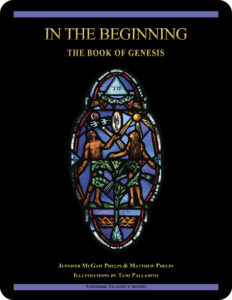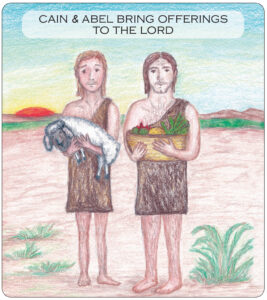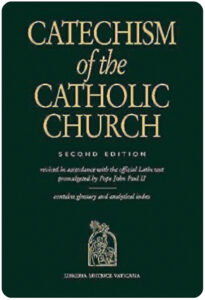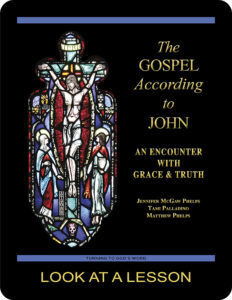 In the Beginning:
In the Beginning:
The Book of Genesis
Lesson 4 Cain Rose Up Against His Brother
the book of Genesis 4:1–26
Revised Standard Version Catholic Edition (RSVCE)*
New American Bible Revised Edition (NABRE)*
Catechism of the Catholic Church
ex libris (in our library)
cross references in the book of Genesis
next lesson: The Wickedness of Man Was Great
This material coordinates with Lesson 4 on pages 22–26 in the study book In the Beginning: The Book of Genesis.
“And God saw everything that he had made, and behold, it was very good. And there was evening and there was morning, a sixth day. Thus the heavens and the earth were finished, and all the host of them. And on the seventh day God finished his work which he had done, and he rested on the seventh day from all his work which he had done.”—the book of Genesis 1:31—2:2
welcome to our in-depth study of the book of Genesis
We invite interested groups and individuals to check out the sample first lesson from this 28-lesson  Turning to God’s Word Catholic Bible study.
Turning to God’s Word Catholic Bible study.  These online study pages link to our free lesson video overviews as well as to a list of cross references in the biblical text. Other study aids include maps, charts, illustrations, additional commentary, and prayers based on the primary Scripture in each lesson. In the Beginning: The Book of Genesis has been granted an imprimatur and can be purchased from our website shop. If you have a Bible-study question or comment, click on one of the “ask us your question” or “what do you think” buttons on any online study page.
These online study pages link to our free lesson video overviews as well as to a list of cross references in the biblical text. Other study aids include maps, charts, illustrations, additional commentary, and prayers based on the primary Scripture in each lesson. In the Beginning: The Book of Genesis has been granted an imprimatur and can be purchased from our website shop. If you have a Bible-study question or comment, click on one of the “ask us your question” or “what do you think” buttons on any online study page.
open with prayer
It’s always wise to begin any Bible study with prayer, whether reading the Scriptures alone or meeting with others in a discussion study group. You can pray using your own words or use one of the opening prayers on our website. We especially like the following:
Lord Jesus, you promised to send your Holy Spirit to teach us all things.
As we read and study your word today,
allow it to touch our hearts and change our lives. Amen.
let’s review—the book of Genesis 3:1–24
Lesson 3 The Fall of Adam & Eve describes how men and women inherit original sin from our first parents, Adam and Eve. This is some of the most important information in the Old Testament, and the third chapter in the book of Genesis sets out the consequence of sin—death. All men and women are born into original sin. This section of the book of Genesis also contains the protoevangelium, or “first good news” (first Gospel), in which God indicates that humanity won’t always be denied access to the tree of the knowledge of good and evil or to the tree of life. Both the Old and New Testaments deal with the steps that God takes to bring about the possibility of salvation for men and women.
a tale of two brothers
 This illustration was created by Turning to God’s Word co-founder Tami Palladino, and it depicts Cain and Abel bringing their offerings to God. Their story frequently is misunderstood, in a large part because of assumptions made about the mark of Cain. While the mark is given by God after Cain has killed his brother, Cain’s punishment consists of being consigned to hard work and exile. The mark itself isn’t a punishment. Instead, it’s a sign provided by God to indicate that Cain is under God’s protection. It’s the first such protective mark recorded in the Scriptures. How many other such protective marks can you name that are part of salvation history? Click on the illustration (right) to enlarge it. Tami’s original illustration is on page 25 in the study book In the Beginning: The Book of Genesis.
This illustration was created by Turning to God’s Word co-founder Tami Palladino, and it depicts Cain and Abel bringing their offerings to God. Their story frequently is misunderstood, in a large part because of assumptions made about the mark of Cain. While the mark is given by God after Cain has killed his brother, Cain’s punishment consists of being consigned to hard work and exile. The mark itself isn’t a punishment. Instead, it’s a sign provided by God to indicate that Cain is under God’s protection. It’s the first such protective mark recorded in the Scriptures. How many other such protective marks can you name that are part of salvation history? Click on the illustration (right) to enlarge it. Tami’s original illustration is on page 25 in the study book In the Beginning: The Book of Genesis.
 the first children are born into the world (17:36)
the first children are born into the world (17:36)
Adam and Eve have been expelled from Eden, but the family has stayed close to  the LORD. Both Cain and Abel make offerings to God, but Cain’s offering isn’t well received. It’s easy to sympathize with his disappointment as a normal human reaction. Turning to God’s Word author Matthew Phelps suggests that it’s important not to lose sight of the fact that Cain had a variety of other much more spiritually productive ways in which he could have responded. The big questions Cain might
the LORD. Both Cain and Abel make offerings to God, but Cain’s offering isn’t well received. It’s easy to sympathize with his disappointment as a normal human reaction. Turning to God’s Word author Matthew Phelps suggests that it’s important not to lose sight of the fact that Cain had a variety of other much more spiritually productive ways in which he could have responded. The big questions Cain might  have asked—though Scripture leaves these unanswered—are: Exactly why was the LORD less than enthusiastic about Cain’s offering? What could Cain have done better? The videos for this study are being redone and will be posted as they become available. The original videos for Lessons 4 through 28 will remain accessible until then.
have asked—though Scripture leaves these unanswered—are: Exactly why was the LORD less than enthusiastic about Cain’s offering? What could Cain have done better? The videos for this study are being redone and will be posted as they become available. The original videos for Lessons 4 through 28 will remain accessible until then.
The Scripture ranges for the videos being redone to accompany this Catholic Bible study from Turning to God’s Word will match the Scripture ranges for the sets of questions in the study book In the Beginning: The Book of Genesis. Viewers will be able to follow along as author Matthew Phelps discusses Lesson 4, “Cain Rose Up Against His Brother,” on pages 22–26 in the study book.
sin—you could look it up in our archives
 Sin lies at the heart of the story of Cain and Abel. It’s clear that murder is a no-no, but Scripture is murky about the nature of sin. The ancients viewed sin as a failure to choose to do good rather than as a conscious choice to do evil. To learn more about the word “sin,” read Lost in Translation, an online column in which Turning to God’s Word author Matthew Phelps helps readers connect with ideas expressed in the original languages of the Scriptures. New Lost in Translation entries are posted on Mondays, and past entries are archived on our website. Contact us if you’d like to receive Lost in Translation by email every week.
Sin lies at the heart of the story of Cain and Abel. It’s clear that murder is a no-no, but Scripture is murky about the nature of sin. The ancients viewed sin as a failure to choose to do good rather than as a conscious choice to do evil. To learn more about the word “sin,” read Lost in Translation, an online column in which Turning to God’s Word author Matthew Phelps helps readers connect with ideas expressed in the original languages of the Scriptures. New Lost in Translation entries are posted on Mondays, and past entries are archived on our website. Contact us if you’d like to receive Lost in Translation by email every week.
flirting with sin
God’s words in the book of Genesis 4:6–7 indicate that Cain’s offering in some way has demonstrated Cain’s failure to do well. We don’t know exactly how Cain has failed, only that he has. Cain evidently has inherited his parents’ relatively new ability to tell good from evil. God questions Cain about the cause of his anger, and God warns that unless Cain determines to do well—that is, to behave in a righteous manner by choosing good over evil—then “sin is lurking at the door.” Cain is flirting with the possibility of sin. His offering taken on its own apparently didn’t qualify as evidence of personal sin. As the story continues, it becomes obvious that Cain fails to choose the good.
a consequence of sin
In the book of Genesis 4:14, Cain says to the LORD: “Behold, thou hast driven me this day away from the ground; and from thy face I shall be hidden … .” Cain’s punishment is similar to the punishment of his parents, Adam and Eve, who were driven out of the garden and denied access to the tree of life. Cain’s own individual sin causes him to be denied the privilege of face-to-face interaction with God.
WHAT DO YOU THINK about choosing between good & evil?
 Scripture tells us that Cain is angry when God prefers Abel’s offering to his own. As Turning to God’s Word author Matthew Phelps mentions in the video overview of this lesson, it’s helpful to ask a few questions to determine the cause of Cain’s anger.
Scripture tells us that Cain is angry when God prefers Abel’s offering to his own. As Turning to God’s Word author Matthew Phelps mentions in the video overview of this lesson, it’s helpful to ask a few questions to determine the cause of Cain’s anger.
 ? Toward whom do you think that Cain’s anger is directed? Some possibilities include Abel, God, and Cain himself.
? Toward whom do you think that Cain’s anger is directed? Some possibilities include Abel, God, and Cain himself.
? For what outcome might Cain be hoping?
? What outcome might Cain reasonably expect as a result of his anger?
? Consider whether it helps Cain’s cause to be angry toward his brother.
? Consider whether it helps Cain’s cause to be angry toward God.
? How might Cain be able to channel his anger in order to allow God to react more favorably toward Cain’s future offerings?
? Have you ever experienced anger as a result of making an unwise choice?
? Have you ever blamed God or someone close to you for a poor decision that you made?
? How do you think it is that anger can lead to sin?
? What can you do to avoid misplaced anger?
the first blood is shed
In the book of Genesis 4:10–11, the LORD says to Cain: “What have you done? The voice of your brother’s blood is crying to me from the ground. And now you are cursed from the ground, which has opened its mouth to receive your brother’s blood from your hand.” It’s only after Adam and Eve have sinned that death becomes a fact of life. As we’ll continue to see, humanity gets into big trouble every time men and women attempt to gain control over matters of life and death. In Scripture, blood is one of two material things believed to be directly connected to life. (Can you figure out the second?)
In a frequently quoted passage from the New Testament, the author of the Letter to the Hebrews 12:22–24 refers to this Old Testament passage in the book of Genesis when he reminds early Christians: “But you have come to Mount Zion and to the city of the living God, the heavenly Jerusalem, and to innumerable angels in festal gathering, and to the assembly of the firstborn who are enrolled in heaven,  and to a judge who is God of all, and to the spirits of just men made perfect, and to Jesus, the mediator of a new covenant, and to the sprinkled blood that speaks more graciously than the blood of Abel.” Learn more in Lesson 17 The Pioneer & Perfecter of Our Faith in The Letter to the Hebrews: An Explanation of the Mechanism of Our Salvation.
and to a judge who is God of all, and to the spirits of just men made perfect, and to Jesus, the mediator of a new covenant, and to the sprinkled blood that speaks more graciously than the blood of Abel.” Learn more in Lesson 17 The Pioneer & Perfecter of Our Faith in The Letter to the Hebrews: An Explanation of the Mechanism of Our Salvation.
degenerate behavior
As the descendants of Cain become more cut off from God, their behavior becomes more and more morally degenerate. Lamech, Cain’s great-great-great grandson, appears to have inherited Cain’s tendency toward anger and rash behavior. Lamech completely misunderstands the point of God’s protective promise of sevenfold vengeance against anyone who would harm Cain. Lamech boasts about enacting vengeance by murdering someone who struck him. The truth that underlies God’s covenant with humanity is that God has control of all issues related to life and death. Although men and women often attempt to complicate things, resolving any questions about good and evil related to life and death concerns is a simple matter. Life comes from God and belongs to God.
watch for more blood
Throughout the Old and New Testaments, blood will be linked to God’s covenant with humanity. The first indirect hint of this occurred in the book of Genesis 1:29–30, in which the word “blood” significantly failed to be mentioned in the LORD’s instructions about what his creatures are allowed to eat. We’ll see other more obvious links between blood and the covenant as we move forward in this study. The Gospels and other New Testament books, especially the Letter to the Hebrews, connect  Jesus’ blood to the New Covenant. In the book of Revelation, blood reappears in a number of cataclysmic incidents related to Final Judgment. The Turning to God’s Word Catholic Bible study The Revelation of Jesus Christ: The Faithful Witness takes an in-depth look at the presence of blood in the apocalyptic prophecies in the last book of the New Testament.
Jesus’ blood to the New Covenant. In the book of Revelation, blood reappears in a number of cataclysmic incidents related to Final Judgment. The Turning to God’s Word Catholic Bible study The Revelation of Jesus Christ: The Faithful Witness takes an in-depth look at the presence of blood in the apocalyptic prophecies in the last book of the New Testament.
t he best Catholic commentary about Scripture
he best Catholic commentary about Scripture
To find out more about how Church teaching is supported by Scripture passages in In the Beginning: The Book of Genesis, check out the Index of Citations in the Catechism of the Catholic Church. Links (Revised Standard Version Catholic Edition [RSVCE*]) to the primary Scripture passages in the lesson and relevant paragraphs in the Catechism are provided here. Not every passage in the biblical text for this Catholic study is referenced in a Catechism paragraph, however.
the book of Genesis 4:1–2—paragraph 2335
the book of Genesis 4:3–7—paragraph 2538
the book of Genesis 4:3–15—paragraph 401
the book of Genesis 4:4—paragraph 2569
the book of Genesis 4:8–12—paragraph 2259
the book of Genesis 4:10—paragraphs 1736, 1867, 2268
the book of Genesis 4:10–11—paragraph 2259
the book of Genesis 4:25–26—paragraph 2335
the book of Genesis 4:26—paragraph 2569
to learn more, read more Scripture
If you’re having difficulty with a particular passage of Scripture, it can be helpful to read the relevant  cross references—but looking these up can take time. To make that easier, we’ve compiled the cross references from the Revised Standard Version Second Catholic Edition (RSV2CE)—the translation that we reprint in our study books. That list can be found at the top of every online study page, and it includes links to cross references in the primary biblical text for In the Beginning: The Book of Genesis.
cross references—but looking these up can take time. To make that easier, we’ve compiled the cross references from the Revised Standard Version Second Catholic Edition (RSV2CE)—the translation that we reprint in our study books. That list can be found at the top of every online study page, and it includes links to cross references in the primary biblical text for In the Beginning: The Book of Genesis.
don’t forget about our indexes & extra online material

 If you’re trying to locate information about a specific Scripture passage, you can look it up in the index at the back of the study book or sample lesson. If you want to find a particular commentary, you can look up its title in the topics index. To learn more about another book of the Bible for which there’s a Turning to God’s Word study, visit the online study directories to read the commentaries and watch any accompanying videos. Finally, if you have a question or would like to make a comment about any of our studies, you can use one of the “ask us your question” or “what do you think” buttons to email our authors.
If you’re trying to locate information about a specific Scripture passage, you can look it up in the index at the back of the study book or sample lesson. If you want to find a particular commentary, you can look up its title in the topics index. To learn more about another book of the Bible for which there’s a Turning to God’s Word study, visit the online study directories to read the commentaries and watch any accompanying videos. Finally, if you have a question or would like to make a comment about any of our studies, you can use one of the “ask us your question” or “what do you think” buttons to email our authors.
ex libris—Church documents & books about religious topics
Link to magisterial documents referred to in our Bible studies at ex libris—magisterial documents.  This listing includes significant recent encyclicals as well as a number of historical Church documents. Recommended books related to Scripture study can be found at ex libris—main bookshelf.
This listing includes significant recent encyclicals as well as a number of historical Church documents. Recommended books related to Scripture study can be found at ex libris—main bookshelf.
wondering how to pronounce some of these words?
The following link is to a reading from the New International Version (NIV) Bible. To listen, open the link and click on the audio icon above the printed text. Although not taken from the translations used in our study materials, the NIV reading provides an audio guide to pronunciation of words in this lesson’s primary biblical text. A close online version of the translation of the Bible used in Catholic liturgy in the United States as well as an audio guide for daily Mass readings for the current month can be found on the website of the United States Conference of Catholic Bishops (USCCB).
the book of Genesis 4:1–26 (NIV)
 close with Bible-based prayer related to this lesson
close with Bible-based prayer related to this lesson
Many of our Catholic study groups like to conclude their discussions with a prayer based on the scriptural focus of their lesson, and some participants include Scripture-specific prayer in their individual study. If you’re uncomfortable composing your own Bible-based prayers, you can follow our four easy steps. If you prefer, you can use the following prayer based on this lesson’s text from the book of Genesis.
O God, you wish for us to honor all life that you’ve created.
Grant us the strength to turn away from anger
and toward your loving mercy
that we always might choose to do good.
We ask this in the name of your Son, Jesus Christ,
who experienced such human emotions as anger
but never allowed emotion to lead to sin. Amen.
Lesson 5 The Wickedness of Man Was Great—the book of Genesis 5:1—6:10
Lesson 3 The Fall of Adam & Eve—the book of Genesis 3:1–24
you also may like our study of the Gospel According to John
 The Gospel According to John: An Encounter with Grace & Truth, a 25-lesson Catholic Bible study with an imprimatur, examines the Fourth Gospel’s view of Jesus Christ as the Son of God, with special emphasis on the institution of the sacraments of the Church as the means by which Christians are purified and made holy. This recently revised study includes maps and additional commentary, and takes a closer look at the way in which Jesus relates to individual men and women. Click on the book’s cover to view a sample lesson.
The Gospel According to John: An Encounter with Grace & Truth, a 25-lesson Catholic Bible study with an imprimatur, examines the Fourth Gospel’s view of Jesus Christ as the Son of God, with special emphasis on the institution of the sacraments of the Church as the means by which Christians are purified and made holy. This recently revised study includes maps and additional commentary, and takes a closer look at the way in which Jesus relates to individual men and women. Click on the book’s cover to view a sample lesson.
start a Turning to God’s Word Bible study
 Thank you for your interest in our study In the Beginning: The Book of Genesis.
Thank you for your interest in our study In the Beginning: The Book of Genesis.  Information about beginning a Turning to God’s Word Catholic Bible study can be found at start a Bible study. Tami, Matthew, and I are available to answer questions and offer support. Contact us if you’d like to start a Turning to God’s Word study or have your schedule listed with other TtGW study groups on our website. —Jennifer
Information about beginning a Turning to God’s Word Catholic Bible study can be found at start a Bible study. Tami, Matthew, and I are available to answer questions and offer support. Contact us if you’d like to start a Turning to God’s Word study or have your schedule listed with other TtGW study groups on our website. —Jennifer
*There are seven deuterocanonical books in the Old Testament—the Books of Tobit, Judith, Wisdom, Sirach, Baruch, and First and Second Maccabees, as well as some passages in the Books of Esther and Daniel. Protestants usually refer to these works as “apocryphal,” a word that means “outside the (Protestant) canon” because they’re excluded from most Protestant Bibles. The word “deuterocanonical” means “second canon”; Catholics use that word to refer to any section of the Catholic Old Testament for which there are no extant, or existing, Hebrew manuscripts. All of the deuterocanonical books appear in the Septuagint, the earliest remaining versions of which date to the 1st century B.C. This Greek translation of the Old Testament was in common use by Jews at the time of Jesus—but the same books aren’t found in existing Hebrew manuscripts, which aren’t as old as the oldest version of the Septuagint. Learn more by reading How Do Catholic & Protestant Bibles Differ?
Turning to God’s Word printed Bible studies use the 2006 Revised Standard Version Second Catholic Edition (RSV2CE) translation for all Scripture references except those to the Psalms, which are taken from The Abbey Psalms and Canticles, prepared by the Benedictine monks of Conception Abbey and published in 2020 by the United States Conference of Catholic Bishops (USCCB). All Scripture links for the online study pages for In the Beginning: The Book of Genesis are to the 1966 Revised Standard Version Catholic Edition (RSVCE) translation. The New International Version (NIV) audio recordings follow the same chapter and verse numbering as the RSV Catholic translations, but the NIV translation doesn’t include the deuterocanonical books and passages.
The 1966 RSVCE uses archaic pronouns and verb forms such as “thee,” “thou,” “didst” in the Psalms and in direct quotations attributed to God. The 2006 RSV2CE replaces those with more accessible English. The few significant translation changes in the RSV2CE include rendering almah as “virgin” in the Book of Isaiah 7:14 and restoring the term “begotten” in the Gospel According to John 3:16.
Numbering varies for some passages in this Bible study. Turning to God’s Word studies (print and digital) follow the numbering in the Revised Standard Version Catholic translations (RSV2CE and RSVCE). Discrepancies in the New American Bible Revised Edition (NABRE) are noted in the Index of Scripture Citations in the study book and the online sample.
 You can learn more about the Psalms by viewing a sample lesson from the Turning to God’s Word Catholic Bible study Sing a New Psalm: Communicating with God Through the Prayers of the Church—Volume I: Lauds & Vespers. The second part of that study, Sing a New Psalm: Communicating with God Through the Prayers of the Church—Volume II: Vigils, Day Prayer & Compline, is scheduled for publication in 2025. Some verse numbers may vary in different translations of the Psalms.
You can learn more about the Psalms by viewing a sample lesson from the Turning to God’s Word Catholic Bible study Sing a New Psalm: Communicating with God Through the Prayers of the Church—Volume I: Lauds & Vespers. The second part of that study, Sing a New Psalm: Communicating with God Through the Prayers of the Church—Volume II: Vigils, Day Prayer & Compline, is scheduled for publication in 2025. Some verse numbers may vary in different translations of the Psalms.
